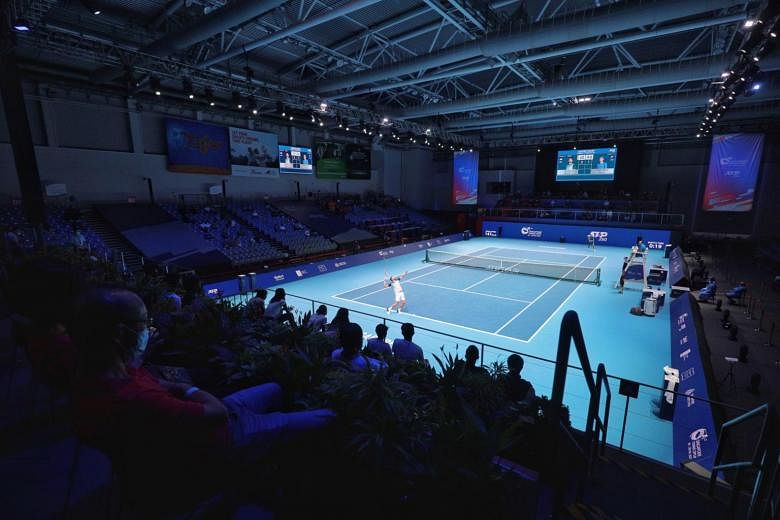SINGAPORE - While most people were gearing up for their reunion dinner on Feb 11, the eve of Chinese New Year, Kelvin Goh and his team from event planning firm Red Spade were instead meeting a team from the Pan Pacific Hotel to iron out details on the layout of a Covid-19 testing site in the hotel.
The site would be the venue where over 200 overseas athletes, staff and officials flying in for the recent Singapore Tennis Open (STO) would undergo polymerase chain reaction (PCR) tests daily.
Red Spade, which Goh co-founded, was in charge of administering the daily PCR test and Antigen Rapid Test (ART) to all local and foreign personnel involved in the ATP 250 event which took place at the OCBC Arena from Feb 22-28.
The PCR testing site for players and officials was located in an open area in the hotel while the ART testing site which served 300 local staff daily and up to 500 spectators over the weekend was at the Singapore Sports Hub Visitors Centre.
Like Goh and his team, most of the tournament's partners, including production company Kin and sports facilities and surfaces specialist Kohup Sports, worked through the holidays so that the STO could start as planned.
In total, some 16 local companies put on a show that was televised worldwide in the span of approximately two months. With no positive Covid cases arising from the tournament, experts feel that Singapore Inc served up an ace in organising the tournament, and that together with the efforts of mixed martial arts organisation One Championship, the project would provide a road map as the country seeks to put on more international events this year.
While this year's golf Singapore Open has been cancelled, the HSBC Women's World Championship, badminton's Singapore Open, Formula One's Singapore Grand Prix and Singapore Rugby Sevens are all set to take place this year.
Singapore will also host two groups for the June 22-28 group stage of the AFC Cup that will see six foreign football teams from Asean including Malaysia, Vietnam, the Philippines and Myanmar.
One's events, which began to open doors to spectators in October, are part of a pilot project the Government hopes will help identify a model that can be widely implemented so that more large-scale events can resume safely in Singapore.
Teh Hua Fung , group president of One Championship, said the safety protocols were tested at its closed-door events in China and Bangkok last July and August before staging its first show here since the pandemic in October.
He added: "I'm really proud that we are leading the way in the safe resumption of live events both in Singapore and in the region. Several of our peers and friends in live sports and entertainment have reached out to us to share lessons and we hope to continue to serve as a blueprint to the industry globally."
For both the tennis and MMA events, overseas-based athletes were tested several times - daily for the tennis players - and their movements in Singapore were limited to the event "bubble".
The tennis tournament even designated "micro bubbles" for the players and their entourages and they had no direct contact with local tournament staff, who were also socially distanced.
Virtual press conferences, electronic line judges and dedicated socially-distanced zones were also in place to further segment the working groups.
Praise for protocols
Dr Leong Hoe Nam, an infectious diseases specialist at Mount Elizabeth Novena Hospital, said he was happy with the protocols.
He said: "I think the protocols are extremely tight. Even if there is a spillage, the existing protocols in the public are sufficient to contain. Our local cases in Singapore have not generated secondary cases."
He added that the layers of protection, from the daily testing to individual bubbles, could be the platform for the World Economic Forum set to be held here in August, "like a taster of future meetings".
Still, there were distinct pressures on the organisers, noted Robin Koh, assistant director of Kohup Sports, which put on the flooring for two show courts and three practice courts. He had been approached by Kin in mid-January, and had to scramble to acquire portable net posts at short notice as traditional net posts, which are either bolted or slotted into the ground, would damage the floor of the OCBC Arena.
Fortunately, he managed to get the stock in time from China.

Lessons for the future
Vincent Chai, 45, co-director of events partner Kin, said that similar events usually require at least six months to plan and deliver. The firm has organised other international sporting events including the 2019 rugby sevens, the 2017 to 2019 editions of the Singapore Grand Prix and the 2019 Davis Cup Group III Asia/Oceania ties.
He noted that the tight deadline "meant the usual 12-hour work days became 18- to 20-hour work days for a period of two to three weeks". The number of stakeholders involved also meant "it was a challenge because the amount of communication was massive and it was difficult to make quick decisions and get consensus".
But "the different stakeholders coming together to bring sports events back to Singapore and the tremendous support behind it allowed for us to do this event in merely two months".
Co-director Adrian Tan took the challenges as lessons so they can better prepare for events ahead.
He said: "We can't deny that events coming back must abide by the safety measures. Going through the process of planning the venue with the safe management protocols, we've garnered tremendous knowledge about them and we're better equipped and prepared if another international event comes in."
Citing the example of virtual liaison officers for players, Chai added the team has also learnt to identify which components can go virtual. This reduces manpower and logistics costs and is good for sustainability, he said.
Virtual liaison officers helped players book sessions for practice, gym training, transport, dining and sport massages. All communication was done over text.
Chai noted that the successful delivery of the STO also shows that more events can take place in Singapore, aiding the gradual recovery of the events industry here.
"(Despite the short lead time and challenges), we wanted to be part of something bigger," added Chai, who co-founded Kin with Tan and a third partner Clement Tan in 2017.
"The STO might just be another event in the eyes of Singaporeans but we think it's a great platform to show residents our commitment to the safe return of international sporting events.
"We're hoping that once we show we can do that safely, gradually the market will start opening up."
While additional costs were incurred because of the extra manpower and resources needed for safety, he said it was worth it.
"This stimulus actually produces a lot more goodwill for Singapore on the international stage, being able to hold an ATP event despite the pandemic and doing it well and safely," said Chai, who declined to reveal exact figures.
Despite the challenges, Koh, 33, said he was proud to be part of the event.
"We did it for passion because we all play tennis so we wanted to be involved in this prestigious event. We managed to deliver this because all parties communicated very well with each other," he said.
Additional reporting by Sazali Abdul Aziz


